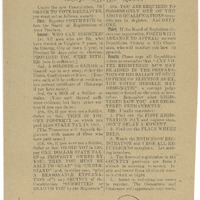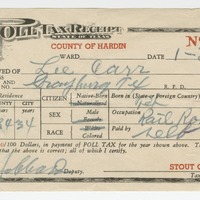 Mississippi Black Codes (1865) Mississippi Black Codes (1865) |
|
Black Codes were enacted by former slave states following the abolishment of slavery with the 13th Amendment in order to restrict the freedom of Black people. Mississippi was the first state to pass such codes in November 1865. Laws like these to the passage of the Civil Rights Act of 1866 and the Fourteenth Amendment.
|
 NAACP v. Allen (1972) NAACP v. Allen (1972) |
|
In this case, the court ruled that the Department of Public Safety of Alabama needed to follow affirmative action principles to reduce discrimination.
|
 Noem v. Abrego Garcia (2025) Noem v. Abrego Garcia (2025) |
|
In this case, the Supreme Court agreed with a lower court's order for the government to "facilitate and effectuate" the return to the U.S. of Kilmar Armando Abrego Garcia who had been deported to El Salvador and detained in the Center for Terrorism Confinement.
|
 Notice to Republican Voters of the 9th Congressional District of Virginia (1902) Notice to Republican Voters of the 9th Congressional District of Virginia (1902) |
|
This broadside publicized information about new voting laws and poll taxes in Virginia.
|
 Obergefell v. Hodges (2015) Obergefell v. Hodges (2015) |
|
In the landmark decision in Obergefell v. Hodges, the Supreme Court found that same-sex marriage was protected under the equal protection clause of the 14th Amendment.
|
 Of Colored Persons (1871) Of Colored Persons (1871) |
|
This act passed by the Virginia General Assembly reflects the race-neutral language of the legal code after the Civil War. Application of these statutes resulted in entrenched Jim Crow segregation.
|
 Of Masters and Apprentices (1887) Of Masters and Apprentices (1887) |
|
Acts passed by the Virginia General Assembly reflected race-neutral language of the legal code after the Civil War. Application of these statutes resulted in entrenched Jim Crow segregation.
|
 Oklahoma's Poor Rich Indians: An Orgy of Graft and Exploitation of the Five Civilized Tribes, Legalized Robbery (1924) Oklahoma's Poor Rich Indians: An Orgy of Graft and Exploitation of the Five Civilized Tribes, Legalized Robbery (1924) |
|
The introduction of Zitkala-Ša's groundbreaking report opened the scene on fraud facilitated by guardians, lawmakers, and county clerks at the expense of minors, heirs, and incompetents during early Oklahoma statehood, and focused on probate courts as a site of legal exploitation.
|
 Papachristou et al. v. City of Jacksonville (1972) Papachristou et al. v. City of Jacksonville (1972) |
|
In this case, the Supreme Court found that state and municipal vagrancy codes were too vague, resulting in their overturning.
|
 Peter and others v. Susanna Elliott and Rachell Elliott (1787) Peter and others v. Susanna Elliott and Rachell Elliott (1787) |
|
This freedom suit was brought forth by 22 enslaved people who were freed by a deed of manumission that was then contested by the executrixes of the former enslaver upon his death. The court found in favor of the re-enslavement of Peter and the other 21 freedmen.
|
 Plessy v. Ferguson (1896) Plessy v. Ferguson (1896) |
|
In Plessy v. Ferguson, the Supreme Court found that racial discrimination did not violate constitutional equal protection. This case established the principle of "separate but equal" which was overturned in 1965 by the decision in Brown v. Board of Education.
|
 Poll Tax Receipt for Lee Carr (1955) Poll Tax Receipt for Lee Carr (1955) |
|
An image of a poll tax receipt from Texas. Poll taxes were a tool to prevent Black people and poor people from voting, since the poll tax was often a significant percentage of someone's weekly income.
|
 President Johnson's Commencement Address at Howard University: "To Fulfill These Rights" (1965) President Johnson's Commencement Address at Howard University: "To Fulfill These Rights" (1965) |
|
In this speech given to Howard University's 1965 graduating class, President Lyndon B. Johnson talks about the Civil Rights and Voting Rights Acts being passed as a result of the Civil Rights Movement and the long-lasting impacts of systemic racism.
|
 President Thomas Jefferson's Confidential Message to Congress (1803) President Thomas Jefferson's Confidential Message to Congress (1803) |
|
Jefferson's statement showed government interest in tribal removal, land appropriation, and eventual dispossession.
|
 Prigg v. Pennsylvania (1842) Prigg v. Pennsylvania (1842) |
|
The case of Prigg v. Pennsylvania evaluated the legality of Pennsylvania's personal liberty laws. Margaret Morgan moved from Maryland to Pennsylvania after being granted her freedom. When relatives of her previous enslaver wanted to reclaim her, they sent Edward Prigg to Pennsylvania to find her. Pennsylvania courts found Prigg guilty of violating the state's personal liberty laws, but the Supreme Court ruled that the federal fugitive slave laws overrule state laws.
|
 Quartering Act (1765) Quartering Act (1765) |
|
A part of the American Mutiny Act, the Quartering Act required American colonists to house and board British soldiers. The Act placed financial burden of quartering soldiers on the colonies. It specified the supplies soldiers of different ranks were expected to be furnished with by the colonies, and the costs associated with failure to comply. This act is the reason the Third Amendment was included in the Constitution of the United States. Like the Stamp and Sugar Acts, the Quartering Act forced colonists into extra financial responsibilities without any representation in Parliament.
|
 Quartering Act (1774) Quartering Act (1774) |
|
One of the Intolerable or Coercive Acts, the Quartering Act of 1774 expanded the Quartering Act of 1765 to allow soldiers to be housed in private homes. While the other Intolerable Acts applied directly to Massachusetts, the Quartering Act applied to all of colonial North America. After this act and the other Intolerable Acts were passed, the First Continental Congress met to formalize a reaction to the perceived overstepping of British parliament.
|
 Roe v. Wade (1973) Roe v. Wade (1973) |
|
Roe v. Wade is the landmark Supreme Court decision that extended the right to privacy to the ability for women to obtain abortion care. The decision was overturned in the 2022 decision of Dobbs v. Jackson Women's Health Organization, returning legislation on abortion care to the states.
|
 Royal Proclamation of 1763 Royal Proclamation of 1763 |
|
Following the Treaty of Paris, the Royal Proclamation of 1765 ceded all North American French territory to the British government. The proclamation set up governments for the new British territories. It also limited settlement past a line drawn down the Appalachian Mountains. As a reward to the soldiers who fought in the war, the document also outlines the amount of land soldiers of different ranks were entitled to.
|
 Seminole Agreement (1900) Seminole Agreement (1900) |
|
This congressional act ratified an agreement with the Seminole Nation concerning allotment, like enrollment and laws of descent. The second proviso established matrilineal descent of lands, money, and property for heirs.
|
 Seminole Tribe of Florida v. Florida (1996) Seminole Tribe of Florida v. Florida (1996) |
|
In the Seminole Tribe of Florida v. Florida, the Supreme Court considered whether the Indian Gaming Regulatory Act violated the state of Florida's state sovereignty as guaranteed by the Eleventh Amendment.
|
 Separate schools for white and colored (1904) Separate schools for white and colored (1904) |
|
Acts passed by the Virginia General Assembly reflected race-neutral language of the legal code after the Civil War. Application of these statutes resulted in entrenched Jim Crow segregation.
|
 She's Been Her Own Mistress: The Long History of Charlotte Dupee v. Henry Clay, 1790-1840 (2020) She's Been Her Own Mistress: The Long History of Charlotte Dupee v. Henry Clay, 1790-1840 (2020) |
|
This essay refocuses the story of Charlotte Dupee v. Henry Clay on Charlotte herself, detailing her long struggle navigating the strategies and pathways to freedom.
|
 Slaves and Free Negroes (1849) Slaves and Free Negroes (1849) |
|
This act passed by the Virginia General Assembly reflects the racialization of the antebellum legal code.
|
 Stamp Act (1765) Stamp Act (1765) |
|
The Stamp Act placed a tax on various printed material like legal documents, playing cards, and newspapers. The act specifies skins and pieces of parchment serving various legal roles and the differing amounts of tax each document needed. The tax’s payment was confirmed by the placement of a stamp indicating a specific amount on the good. It was the first of a series of taxes placed on the North American colonies without their consent, sparking protest and resistance.
|
 Mississippi Black Codes (1865)
Mississippi Black Codes (1865) NAACP v. Allen (1972)
NAACP v. Allen (1972) Noem v. Abrego Garcia (2025)
Noem v. Abrego Garcia (2025) Notice to Republican Voters of the 9th Congressional District of Virginia (1902)
Notice to Republican Voters of the 9th Congressional District of Virginia (1902) Obergefell v. Hodges (2015)
Obergefell v. Hodges (2015) Of Colored Persons (1871)
Of Colored Persons (1871) Of Masters and Apprentices (1887)
Of Masters and Apprentices (1887) Oklahoma's Poor Rich Indians: An Orgy of Graft and Exploitation of the Five Civilized Tribes, Legalized Robbery (1924)
Oklahoma's Poor Rich Indians: An Orgy of Graft and Exploitation of the Five Civilized Tribes, Legalized Robbery (1924) Papachristou et al. v. City of Jacksonville (1972)
Papachristou et al. v. City of Jacksonville (1972) Peter and others v. Susanna Elliott and Rachell Elliott (1787)
Peter and others v. Susanna Elliott and Rachell Elliott (1787) Plessy v. Ferguson (1896)
Plessy v. Ferguson (1896) Poll Tax Receipt for Lee Carr (1955)
Poll Tax Receipt for Lee Carr (1955) President Johnson's Commencement Address at Howard University: "To Fulfill These Rights" (1965)
President Johnson's Commencement Address at Howard University: "To Fulfill These Rights" (1965) President Thomas Jefferson's Confidential Message to Congress (1803)
President Thomas Jefferson's Confidential Message to Congress (1803) Prigg v. Pennsylvania (1842)
Prigg v. Pennsylvania (1842) Quartering Act (1765)
Quartering Act (1765) Quartering Act (1774)
Quartering Act (1774) Roe v. Wade (1973)
Roe v. Wade (1973) Royal Proclamation of 1763
Royal Proclamation of 1763 Seminole Agreement (1900)
Seminole Agreement (1900) Seminole Tribe of Florida v. Florida (1996)
Seminole Tribe of Florida v. Florida (1996) Separate schools for white and colored (1904)
Separate schools for white and colored (1904) She's Been Her Own Mistress: The Long History of Charlotte Dupee v. Henry Clay, 1790-1840 (2020)
She's Been Her Own Mistress: The Long History of Charlotte Dupee v. Henry Clay, 1790-1840 (2020) Slaves and Free Negroes (1849)
Slaves and Free Negroes (1849) Stamp Act (1765)
Stamp Act (1765)